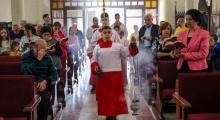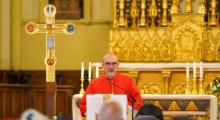Issued by the Catholic Center for Studies and Media - Jordan. Editor-in-chief Fr. Rif'at Bader - موقع أبونا abouna.org

Following is the text of the meditation for the sixth Sunday of Easter 2025 by His Beatitude Cardinal Pierbattista Pizzaballa, Latin Patriarch of Jerusalem, dated May 25, 2025:
The call to remember runs through the entire Old Testament.
In some books, such as Deuteronomy, the call becomes urgent, because for the people preparing to enter the Promised Land, there is no other way of life than remembering what God has accomplished for them, the deliverance that God has wrought.
The call to remember comes again and again and is urgent, precisely because man tends to forget.
The great task of the prophets is therefore to remind the people of what God has done and to make them live in the memory of God, i.e. in his presence. For people’s great sin is that of forgetfulness: they forget God and turn to idols.
But the history of salvation teaches us once again that man is not able to remember on his own. Man knows how to forget, but he does not know how to remember, and he distances himself from the source of strength that is God’s history. And when he forgets, man actually loses his identity, loses himself, loses life, because we are the Word that God speaks in us and for us.
In today’s Gospel passage, (John 14:23-29) it is precisely this verb, to remember, that takes center stage: “The holy Spirit that the Father will send in my name—he will teach you everything and remind you of all that told you” (Jn 14:26). It is a key verse for the life of the Lord’s disciples, and we dwell on this verse.
The first thing to note is that this memory is a gift of the Spirit.
It is not a psychological movement, not a human effort. It is the Spirit who will work this memory in believers, who will make them remember the words of the Lord, who will keep the memory of God alive in them. So, it is not a question of holding back something of what Jesus said, but of remaining open to the Spirit and letting him work.
However, the Spirit does not engage in archeology of the past, he does not simply repeat what Jesus said, but he brings his Word alive in us. God’s remembrance is not a nostalgic return to something in the past that has been completed, but exactly the opposite. The Spirit reminds us of the Word because he makes it alive in us. He makes it the source of our lives, the criterion for our decisions, our desire and our will to put it into practice in our words and deeds.
We should not be afraid of forgetting anything. Rather, we should place ourselves at the Spirit’s disposal and pay attention to his promptings, which arise deep in our hearts at all times.
According to the Gospel, the Spirit not only remembers, but also teaches. Remembering God in us also goes through a deep understanding of Jesus’ life. Superficial listening is not enough. We have to learn to know and recognize the features of Christ’s face, his thinking, the deep logic that animated him. If we understand something, we will also remember it.
A final element related to this verse is the fact that the memory of Jesus, which works in us through the Spirit, has a certain claim to totality: The Spirit will teach and remember everything Jesus said.
This totality does not refer so much to the sum of all the things Jesus said and did.
Rather, it means that it refers to the person of Jesus himself, to his presence, to the meaning of his life. The Spirit in us makes this present. He does not simply cause us to perform one action and not another, to remember one word and not another, but to experience what Jesus lived, or rather to live as Jesus lived.
And we find this claim to wholeness summarized in the verse that follows the verse we have been dealing with, namely: “Peace I leave with you; my peace I give to you”. (John 14:27)
Peace is the first gift of the Risen Lord, it is the fullness of the gifts, the presence of the kingdom of God among us. It is the “total” reconciliation with the Father and with one another that Jesus achieves through his Passover, through his going to the Father. (John 14:28)
So we could say that the Spirit reminds us of peace, fills us with peace. He makes the Lord Jesus and his work of peace, reconciliation and fellowship present in us.
And that is why our hearts must not be troubled and must not be afraid despite everything: “Peace I leave with you; my peace I give to you. Not as the world gives do I give it to you. Do not let your hearts be troubled or afraid”. (John 14:27)
+ Pierbattista







